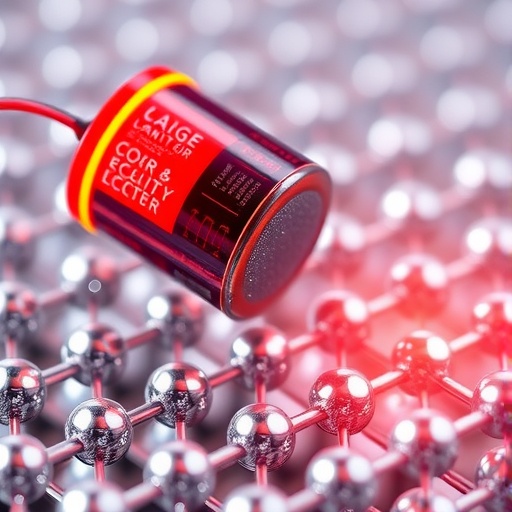Recent advancements in material science have placed a spotlight on the seamless integration of nanotechnology into energy storage solutions. The latest research led by Zhang and colleagues unveils a novel synthesis approach for cobalt(II) fluoride (CoF₂) nanoparticles, demonstrating substantial improvements in performance for their use in supercapacitor electrodes. The findings, published in “Ionics,” elaborate on the potential of these nanoparticles to redefine energy storage systems amid the global push for more efficient power sources.
Supercapacitors, known for their ability to provide rapid bursts of energy, are pivotal in various applications, from electric vehicles to electronic devices. The performance of supercapacitors largely depends on the materials used in their electrodes. Cobalt(II) fluoride has garnered interest due to its chemical properties and capacity to enhance charge storage. This research aims to exploit these desirable properties through an innovative synthesis method that promises to yield superior conductivity and stability.
The synthesis of CoF₂ nanoparticles explored in this study employs a unique chemical vapor deposition technique that allows for precise control over the size and distribution of the particles. This meticulous methodology not only maximizes the surface area of the nanoparticles but also enhances their electrochemical performance. By achieving a size reduction to the nanoscale, the researchers were able to significantly improve the materials’ ability to transport ions, which is crucial for the quick charging and discharging cycles required in supercapacitors.
Characterization techniques, including X-ray diffraction and scanning electron microscopy, played a critical role in validating the synthesis of CoF₂ nanoparticles. Through these methodologies, the researchers were able to confirm the crystalline structure and morphology of the synthesized nanoparticles, ensuring that they met the necessary standards for high-performance electrodes. The results showcased uniformity in particle size, which is essential for consistent performance in supercapacitor applications.
Electrochemical testing was conducted to assess the performance of the CoF₂ nanoparticles in supercapacitor configurations. Key metrics such as specific capacitance, energy density, and power density were meticulously measured. The results indicated that the newly synthesized nanoparticles surpass traditional electrode materials, demonstrating an impressive specific capacitance that highlights their potential in energy storage applications.
The importance of energy density in supercapacitors cannot be overstated. The newly developed CoF₂ nanoparticles achieve elevated energy density levels, aligning with the current demands for more compact and powerful energy storage solutions. Researchers noted that the innovative synthesis method not only enhances the energy storage capability but also maintains the structural integrity of the electrodes, a critical factor for long-term reliability in operational environments.
Another noteworthy aspect of this research is its focus on sustainability. The synthesis process for CoF₂ nanoparticles was designed to minimize waste and energy consumption. This approach reflects a broader trend in material science toward developing greener technologies that do not compromise performance. The researchers aim to inspire further exploration into environmentally friendly synthesis methods for a range of materials utilized in energy storage.
Furthermore, the compatibility of CoF₂ nanoparticles with various electrolyte systems was investigated. The findings suggest that these nanoparticles exhibit favorable interactions with commonly used electrolyte solutions, paving the way for widespread application in commercial supercapacitors. This adaptability could facilitate the integration of CoF₂-based electrodes into existing energy storage technologies, enhancing their overall performance without necessitating substantial redesigns.
As the demand for renewable energy sources continues to rise, the urgency for efficient energy storage solutions has never been greater. The implications of this research extend beyond merely improving supercapacitor performance. The insights gleaned from the synthesis of CoF₂ nanoparticles could inform future studies aimed at developing similar materials that hold promise for revolutionizing energy storage in batteries, providing a multi-faceted approach to energy needs.
The quest for finding the perfect balance between cost, efficiency, and sustainability in energy storage remains a paramount challenge for scientists and engineers worldwide. The introduction of CoF₂ nanoparticles into the field acts as a catalyst for future innovations—an essential step toward achieving breakthroughs that will shape the next generation of power systems. With the groundwork laid by Zhang and his team, the future of energy storage appears bright, beckoning researchers to delve deeper into the possibilities within nanomaterials.
In conclusion, the novel synthesis of CoF₂ nanoparticles represents a significant leap forward in the quest for advanced supercapacitor electrodes. By enhancing charge storage capabilities and minimizing environmental impact, this research not only contributes to scientific knowledge but also aligns with a broader mission to create sustainable energy solutions. As the field of nanotechnology continues to evolve, the techniques and discoveries from this study are likely to inspire further research and development, propelling the energy storage sector into a new era of efficiency and performance.
The pursuit of efficient energy storage solutions is critical to addressing the challenges posed by climate change and the increasing global energy demand. With breakthroughs like the one presented by Zhang and his team, there is hope that integrating advanced materials into energy systems can contribute to a more sustainable and technologically advanced future, transforming how we power our lives while safeguarding our planet for generations to come.
Subject of Research: Cobalt(II) fluoride nanoparticles for supercapacitor electrodes
Article Title: Novel synthesis of CoF2 nanoparticles for high-performance supercapacitor electrodes.
Article References: Zhang, Y., Zhang, X., Zhang, Q. et al. Novel synthesis of CoF2 nanoparticles for high-performance supercapacitor electrodes. Ionics (2025). https://doi.org/10.1007/s11581-025-06676-5
Image Credits: AI Generated
DOI: https://doi.org/10.1007/s11581-025-06676-5
Keywords: CoF₂ nanoparticles, supercapacitors, energy storage, nanotechnology, sustainable materials, chemical vapor deposition, electrochemical performance.
Tags: chemical vapor deposition techniquecobalt(II) fluoride nanoparticleselectrochemical performance of CoF2energy storage solutions advancementsenhanced charge storage materialshigh-performance supercapacitor electrodesinnovative synthesis methods for supercapacitorsnanomaterials in power systemsnanotechnology in energy storagerapid energy delivery applicationsstability and conductivity of electrodessupercapacitor material properties





